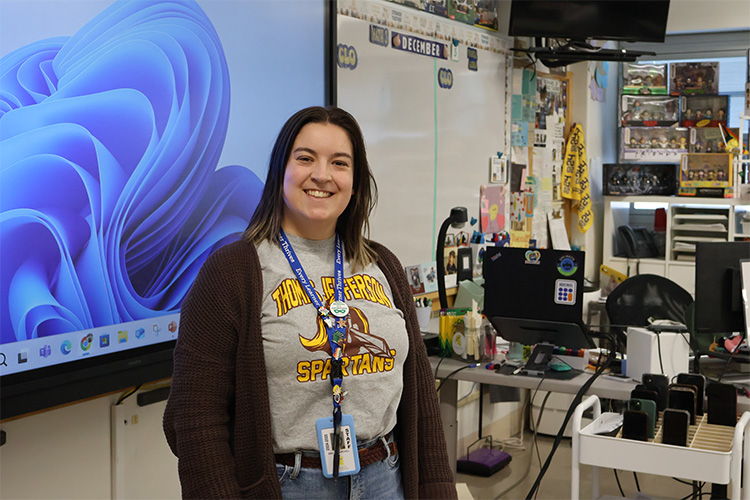
Churchill aids Spartans within and beyond her own classroom. photo by Ben Scherer
A temporary addition to the Thomas Jefferson Science Department, is now a permanent member of the Math Department.
Emily Churchill previously taught middle school Special Education math and science in Springfield, Illinois for five years. Churchill acquired her degree at Illinois State University, majoring in Special Education for Learning and Behavior, and graduating with the ability to provide support for students ranging from birth to 21 years of age. Due to an incredibly high demand for Special Education teachers, Churchill moved to Denver in order to educate at the high school level. She recalled having applied “to just about every open high school Special Education position in DPS (Denver Public Schools).” After careful consideration upon acceptance, Churchill knew TJ was the right fit for her and, now, she “could not imagine being anywhere else.”
Churchill was originally hired at TJ to be a Special Education science teacher, co-teaching in various classes. However, following staffing changes, she was temporarily put into a Biology teaching position. She then moved to a permanent Special Education math position, where she instructs her own Math 1 class, and co-teaches in other Math 1 and Math 3 classes. Churchill also instructs a Student Support class, where she helps students be as successful as possible in school, teaching study skills and other vital habits for future success. Being a part of Exceptional Student Services (formerly known as the Special Education Department), Churchill attends both math team meetings and department team meetings, ensuring students with IEPs are advocated for and heard.
Working in education runs in the Churchill family. Her grandfather was a school Psychologist, her mother a Speech Language Pathologist, and her aunt a Special Education teacher. Churchill said that “being surrounded by [teaching] growing up made [her] want to be a teacher ever since [she] was a little girl,” but she was unsure which area of the profession she wanted to pursue. Early on, she got the perfect opportunity as a student assistant of sorts. Though she initially intended to assist her volleyball coach, she was steered toward Mrs. Welker, a Special Education teacher who was “very instrumental” in her decision to go into the field. Throughout her middle and high school career, she would give up her study halls to help Welker with students with disabilities and their independent work and ‘jobs’ around the school (helping the custodians). Special Education holds a large place in Churchill’s heart because “every child deserves an education, no matter their ability or disability.” At the high school level, she believes having this option accessible is especially important because students have to be more independent and start thinking about what their life will be like after they graduate. Special Education “levels the playing field” in her mind, as she gets to help her students decide what they want to do and how to be successful in that choice.
This educator knows that math starts to become more complicated in high school, but “what is life without some challenges, right?” Churchill has asserted her love for mathematics and the concrete answers this subject provides. She mentioned the struggle students with disabilities often have with abstract answers in their subjects, but that “math is very black and white.”
Through experience as a teacher, she inevitably learned much more about supporting her students than her degree had initially taught her. “Every student is different,” she affirmed. Churchill continues to whole-heartedly learn how to serve her students each day, and she will continue to do so for the rest of her career.